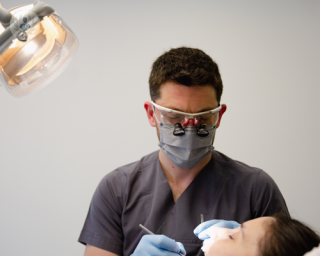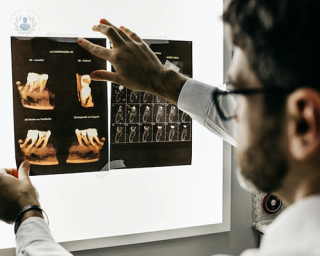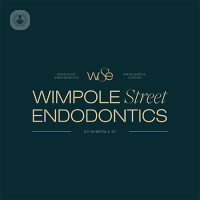What is root canal treatment?
Root canal treatment (endodontics) is a dental procedure used to repair or save a tooth that has been infected with a bacterial infection. The part of the tooth affected is the centre of the tooth (the root canal) which is comprised of soft tissue and the tooth’s nerve.

Why is it done?
Root canal treatment is done to treat infection in the root canal of a tooth, the part of the tooth below the crown, that extends into the jaw and anchors the tooth. This central part of the tooth consists of what’s called dental pulp which is soft tissue. The infection could be caused by tooth decay, a leaky filling or trauma. Root canal treatment is only carried out when an x-ray shows that a bacterial infection is present. An infection in the root canal cannot be cured with antibiotics alone.
What does it involve?
First, the bacteria from the root canal is removed by removing the pulp or centre of the tooth and removing the nerve. Then the tooth is filled and sealed with either a filling or a crown. Sometimes the patient may want to have the tooth extracted, however, this is not normally recommended.
How do you prepare for it?
Before treatment, the patient will be given a local anaesthetic, to ensure that they feel no pain during the treatment. The treatment may require more than one dental visit.
Aftercare
After treatment, the tooth may be sensitive for a few days and any hard or sticky foods should be avoided until the tooth fully heals. Over-the-counter painkillers such as paracetamol can be taken to reduce inflammation and to relieve any discomfort. It’s important after treatment to take care of your teeth to avoid any further infections by:
-
Maintaining good oral hygiene
-
Cutting back on sugary foods
-
Quitting smoking
Alternatives to root canal treatment
The only alternative treatment to root canal is tooth extraction, followed by replacing the tooth with a bridge, implant or removable denture to restore chewing ability and to prevent neighbouring teeth from shifting. These procedures are more expensive and time-consuming and will require adjacent treatments.
What specialist carries out root canal treatment?
Root canal treatment is carried out by an endodontist or a dentist.
11-10-2017 06-09-2023лечение корневых каналов
What is root canal treatment?
Root canal treatment (endodontics) is a dental procedure used to repair or save a tooth that has been infected with a bacterial infection. The part of the tooth affected is the centre of the tooth (the root canal) which is comprised of soft tissue and the tooth’s nerve.

Why is it done?
Root canal treatment is done to treat infection in the root canal of a tooth, the part of the tooth below the crown, that extends into the jaw and anchors the tooth. This central part of the tooth consists of what’s called dental pulp which is soft tissue. The infection could be caused by tooth decay, a leaky filling or trauma. Root canal treatment is only carried out when an x-ray shows that a bacterial infection is present. An infection in the root canal cannot be cured with antibiotics alone.
What does it involve?
First, the bacteria from the root canal is removed by removing the pulp or centre of the tooth and removing the nerve. Then the tooth is filled and sealed with either a filling or a crown. Sometimes the patient may want to have the tooth extracted, however, this is not normally recommended.
How do you prepare for it?
Before treatment, the patient will be given a local anaesthetic, to ensure that they feel no pain during the treatment. The treatment may require more than one dental visit.
Aftercare
After treatment, the tooth may be sensitive for a few days and any hard or sticky foods should be avoided until the tooth fully heals. Over-the-counter painkillers such as paracetamol can be taken to reduce inflammation and to relieve any discomfort. It’s important after treatment to take care of your teeth to avoid any further infections by:
-
Maintaining good oral hygiene
-
Cutting back on sugary foods
-
Quitting smoking
Alternatives to root canal treatment
The only alternative treatment to root canal is tooth extraction, followed by replacing the tooth with a bridge, implant or removable denture to restore chewing ability and to prevent neighbouring teeth from shifting. These procedures are more expensive and time-consuming and will require adjacent treatments.
What specialist carries out root canal treatment?
Root canal treatment is carried out by an endodontist or a dentist.


Extracting and replacing molars: this is how the treatment works
Por Professor Christian Mehl
2025-01-16
Usually tooth removal is a fairly straightforward process, but there are some risks involved. We got in contact with the highly experienced specialist in prosthodontics, Professor Christian Mehl, to find out what the risks are. In this article, we also discuss when a molar would definitely need to be extracted, how the molar is removed and if the procedure is painful. подробнее


Root canal vs tooth extraction: which treatment is better for a damaged tooth?
Por Dr Amir Mirzaei
2025-01-16
There are two common treatment options for a damaged tooth with nerve exposure; root canal and tooth extraction. Which is better? Leading dentist Dr Amir Mirzaei, who practises in Oxford, shares his expertise on both procedures and explains in which cases they are more favourable. подробнее


Apicoectomy: How successful is root-end surgery?
Por Mr Corneliu Gherasim
2025-01-16
In this detailed guide to apicoectomy surgery, highly esteemed specialist endodontist Mr Corneliu Gherasim offers expert insight on when the procedure is required and how it is performed. The renowned specialist also sheds light on the success rates of apicoectomy surgery and how the use of advanced surgical techniques and technology positively impact patients’ recovery. подробнее


Endodontist vs. dentist: what's the difference and the latest in dental technologies?
Por Dr Michael Sultan
2025-01-16
Do you need a root canal but not sure whether your dentist or a specialist should do it? Here, one of our top endodontics Dr Michael Sultan explains why the latter might be the best option and how dental technology has evolved over the last 20 years. подробнее
Врачи-специалисты в области лечение корневых каналов

Medicare Clinic
Medicare Clinic
603 Oxford Rd, Reading RG30 1HL, United Kingdom
No existe teléfono en el centro.
Si haces uso de este teléfono facilitado por TOP DOCTORS nos autorizas al tratamiento de tu teléfono para fines estadísticos y comerciales. Para más información, lee nuestra Политика конфиденциальности
Top Doctors

Wimpole Street Endodontics
Wimpole Street Endodontics
Ground Floor Suite, 53 Wimpole St, London
No existe teléfono en el centro.
Si haces uso de este teléfono facilitado por TOP DOCTORS nos autorizas al tratamiento de tu teléfono para fines estadísticos y comerciales. Para más información, lee nuestra Политика конфиденциальности
Top Doctors

Forest & Ray - Dentists, Orthodontists, Implant Surgeons
Forest & Ray - Dentists, Orthodontists, Implant Surgeons
8F Gilbert Pl, London, WC1A 2JD
No existe teléfono en el centro.
Si haces uso de este teléfono facilitado por TOP DOCTORS nos autorizas al tratamiento de tu teléfono para fines estadísticos y comerciales. Para más información, lee nuestra Политика конфиденциальности
Top Doctors
-
Medicare Clinic
603 Oxford Rd, Reading RG30 1HL, United Kingdom, ReadingЭксперт в области :
- Аллергология
- Кардиология
- ортопедическая хирургия
- УЗИ
- эндокринология
- фертильность
-
Wimpole Street Endodontics
Ground Floor Suite, 53 Wimpole St, London, Central LondonЭксперт в области :
- Корневой канал
- кариес
- Контроль над болью
- Стоматология
-
Forest & Ray - Dentists, Orthodontists, Implant Surgeons
8F Gilbert Pl, London, WC1A 2JD, Central LondonЭксперт в области :
- фигурные скобки
- Фарфоровые виниры
- корона
- Эстетическая стоматология
- Имплантология
- Взрослая ортодонтия







